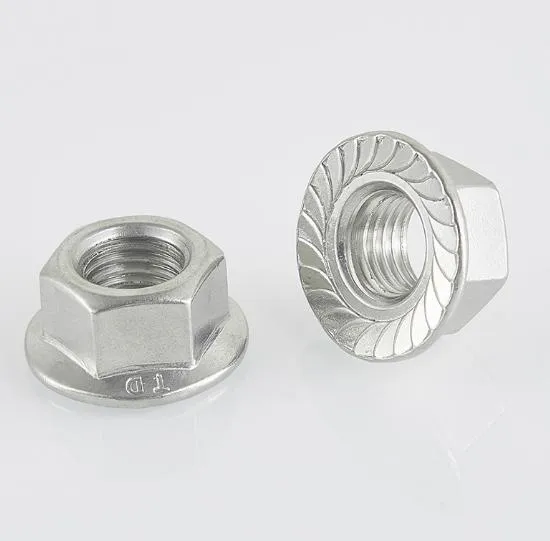

Unshakeable Strength: The Power of Flange Nut Technology
Th5 . 16, 2025 13:52 Trở lại danh sách
Unshakeable Strength: The Power of Flange Nut Technology
Whether it’s supporting a skyscraper’s frame or securing a high-performance machine, the đai ốc mặt bích plays a pivotal role in modern fastening systems. Known for its integrated washer-like base and wide-bearing surface, the đai ốc mặt bích simplifies installations, strengthens grip, and withstands extreme conditions better than standard nuts. For engineers, builders, and manufacturers looking for reliability and longevity, this fastener is far more than a convenience—it's a necessity.

Durability and Wear Resistance of Flange Nut Under Stress
One of the most celebrated features of the đai ốc mặt bích is its superior wear resistance. Thanks to its one-piece design with an enlarged flange at the base, this fastener distributes pressure more evenly across connected surfaces. The result is less stress per square millimeter, meaning both the nut and the connected material last longer under tension.
In daily use, các loại đai ốc mặt bích made from hardened carbon steel or stainless steel display exceptional tensile strength. Their ability to resist thread deformation, stripping, or warping—especially under repetitive torqueing—makes them ideal for industrial and automotive settings. Whether you're tightening a đai ốc mặt bích m10 onto a structural beam or assembling large equipment, the wear resistance remains consistent, reliable, and impressive.
Outstanding Performance in High Temperature and High Pressure
When used in environments exposed to elevated temperatures or intense pressure—such as boiler systems, engine compartments, or factory machinery—the đai ốc mặt bích proves it’s built to endure. Engineered with heat-resistant alloys and precision threading, it maintains its grip where traditional fasteners would loosen or fail.
Especially in the case of stainless các loại đai ốc mặt bích, the thermal expansion is minimal, meaning they don’t compromise the fastening assembly even with repeated temperature fluctuations. From high-pressure pipelines to turbocharged automotive components, the đai ốc mặt bích exhibits high structural integrity and heat stability. For industries where failure is not an option, it’s the go-to choice for dependable fastening.
Application of Flange Nut in the Construction Industry
In construction, where everything from scaffolding to steel framework demands secure locking, the đai ốc mặt bích is a trusted staple. The reason? It eliminates the need for a separate washer, speeding up installation without sacrificing security. Its design enhances clamping force and protects materials from bolt-head gouging or indentation, which is crucial when working with softer substrates.
Builders frequently use đai ốc mặt bích m10 variants in metal framing, bridge assembly, and roofing systems. These nuts resist loosening due to their wide gripping area and often feature serrated flanges that act as lock mechanisms. Whether you’re dealing with heavy steel beams or modular paneling, the đai ốc mặt bích ensures robust performance without the risk of slippage or loosening due to vibration or shifting loads.
Cost-Performance Balance: What Does Flange Nut Price Reflect?
When assessing the giá đai ốc mặt bích, you’re not just buying a piece of hardware—you’re investing in reliability, efficiency, and long-term savings. While đai ốc bích may carry a marginal premium over standard nuts, they eliminate the need for additional washers and reduce installation time dramatically. For large-scale projects, this translates into meaningful labor savings and fewer complications.
Additionally, the durability and multi-functionality of các loại đai ốc mặt bích mean fewer replacements, lower maintenance, and better performance per dollar spent. Whether you need 1,000 pieces for an industrial assembly line or 10 for a small custom build, the return on investment is hard to overlook. In environments where safety and speed matter, the giá đai ốc mặt bích justifies itself with long-lasting value.
Flange Nut FAQs
What makes a flange nut more durable than a standard hex nut?
Các đai ốc mặt bích has a built-in flange that spreads load more evenly and reduces pressure on the mounting surface, leading to less wear and higher durability.
Can a flange nut withstand heat and pressure in industrial applications?
Absolutely. Especially stainless các loại đai ốc mặt bích are designed for high-temperature and high-pressure settings, providing stable performance in demanding environments.
Where is flange nut m10 commonly used in construction?
Các đai ốc mặt bích m10 is ideal for joining steel components in buildings, securing support beams, and anchoring heavy structures due to its strong grip and easy installation.
How does the flange nut price compare to using a nut and washer separately?
Though initially slightly more expensive, the đai ốc mặt bích offers labor savings, enhanced performance, and reduced parts usage, making it more cost-effective over time.
Are all types of flange nuts resistant to vibration?
Yes. Especially those with serrated flanges are excellent at resisting vibration loosening, making them ideal for machinery and vehicles that experience constant movement.
Tin mới nhất
-
The Versatility of Threaded Rods for Your Projects
Tin tứcJun.11,2025
-
The Quality Hex Head Self Tapping Screws for Every Project
Tin tứcJun.11,2025
-
The Essential Fasteners for Every Project
Tin tứcJun.11,2025
-
High-Quality Flange Nuts for Your Next Project
Tin tứcJun.11,2025
-
Explore the Versatility of T Bolts for Your Projects
Tin tứcJun.11,2025
-
Explore the Best Slotted Channels for Your Projects
Tin tứcJun.11,2025

